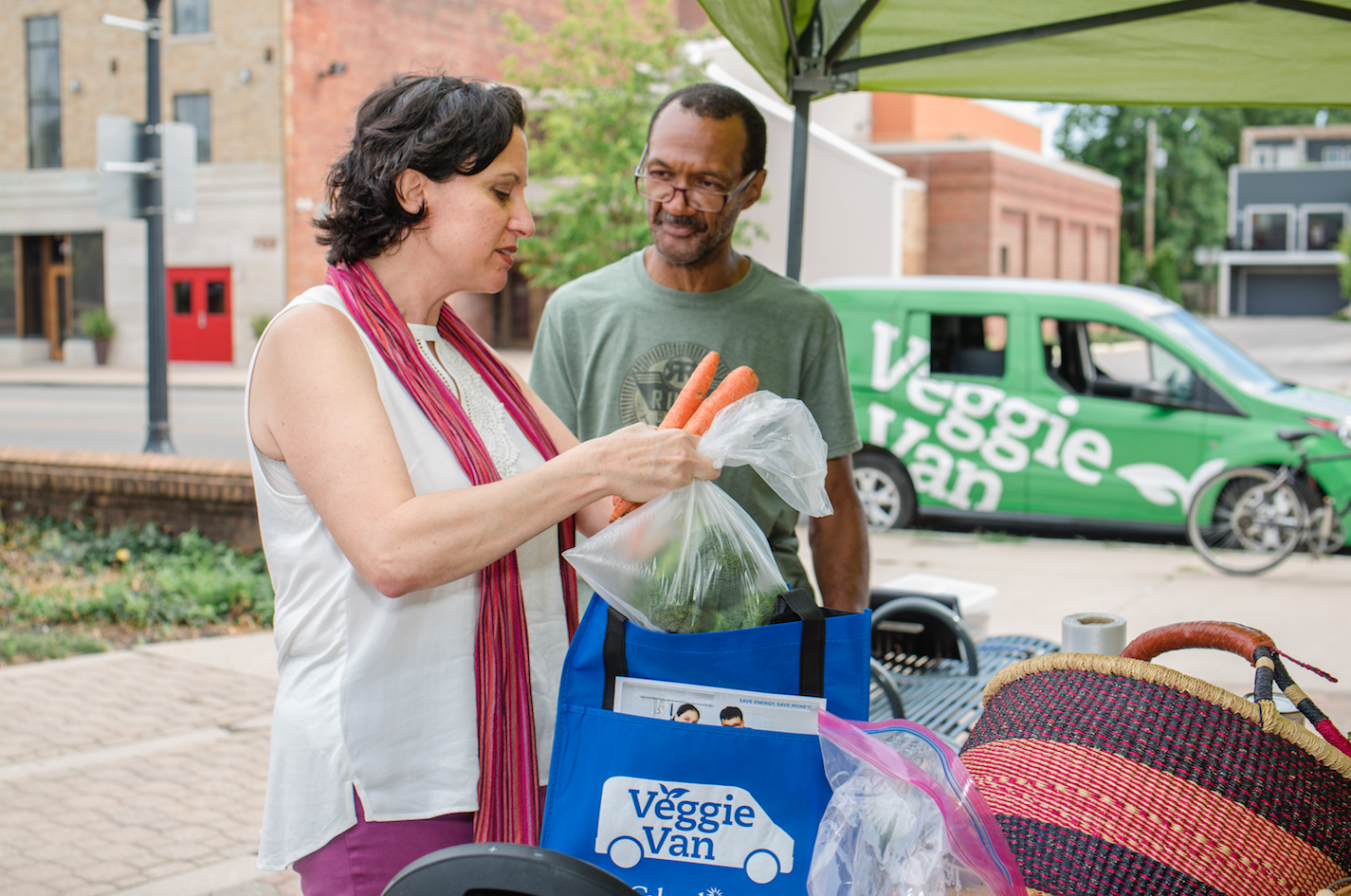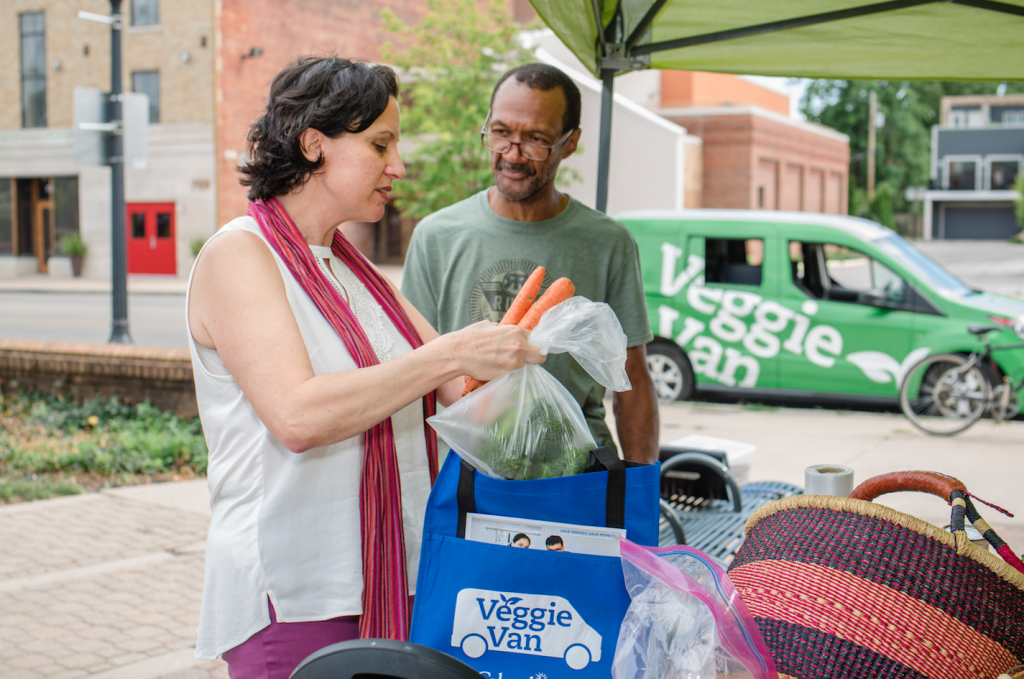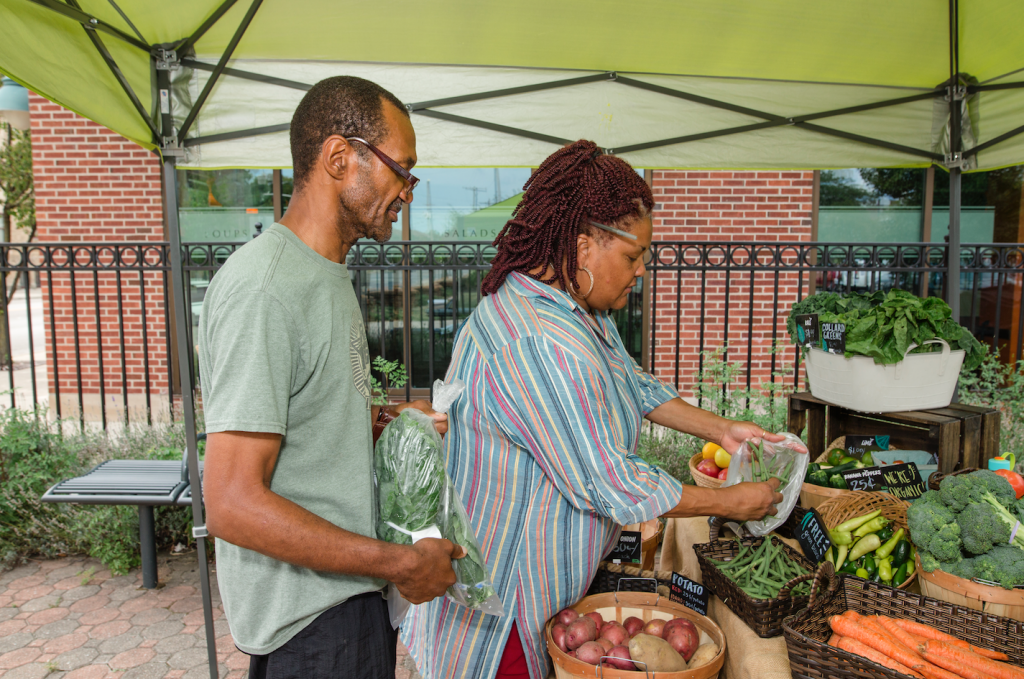Farm to Vehicle: Veggie Van brings affordable staples to those in need

Bushels of greens, squash, tomatoes, beans, and peppers are laid out on tables under a tent on Cleveland Avenue—the organic produce clearly labeled as such. I’m munching on fresh peach salsa, and holding a recipe card listing the ingredients I’ll need to make the recipe at home. It feels like an upscale farmers market, but it’s a different take on the concept. This is the Local Matters Veggie Van, a mobile, affordable market that brings fresh food into neighborhoods under-served by traditional grocers. Every week, the Veggie Van makes regular stops in the city’s Linden, Hilltop, and King-Lincoln neighborhoods.
“Our goal is for you to be able to make a complete meal for under $10,” said Monique Williams-McCoy, Local Matters’ Community Food Access Coordinator. To achieve this, the Veggie Van sells staples such as lemons and limes, and shelf-stable items like beans, rice, and olive oil, in addition to seasonal produce. While the “local” part of the organization’s mission is brought in through food farmed from Local Matters Community gardens and relationships with Ohio growers, what matters most to Williams-McCoy is making sure people have healthy food on their shelves. “It’s important for us to be able to get it local, but it’s more important for people to have access,” she said.

Accessibility goes beyond presence; it’s also about knowledge of how to prepare what’s available. To assist, Williams-McCoy leads cooking demos and hands out samples of prepared foods using the ingredients which are for sale that day. “I’ll have recipe cards. I’ll take them right up here to the market … [and] show them what they need to get,” she said. “We may not have anything fancy like ugly fruit or jackfruit, but we will have those things that … you know how to go about preparing them— where you’re not going to be intimidated.”
First launched in 2009, the Veggie Van didn’t resonate with customers as hoped the first time around. “It was way before its time,” Williams- McCoy explained. But when Kroger’s Northern Lights location closed in early 2018—leaving the Linden area without a major supermarket— staff at Local Matters began thinking about pursuing the idea again. With issues such as food justice, accessibility, and smaller-scale food production garnering attention over the past decade, the timing felt right. Local Matters was selected by the University at Buffalo to participate in a study about the role of mobile food markets on increasing food security and improving fresh food access in communities under-served by grocery stores. The Veggie Van relaunched in July.
BROUGHT TO YOU BY
Community support and partnerships became the key to the project’s success this time around. Ijeoma Nnani, Owner and Pharmacist at Trio Pharmacy, said she was committed to the project. “When Kroger closed down, the whole area became … a fresh produce desert. So I thought of what I [could] do to get people to eat fresh,” she said. Nnani heard about the Veggie Van through conversations with people in the community, and she reached out to Local Matters. “They came, we had a meeting, and that was it.” The Veggie Van now sets up shop in front of her business every Tuesday.
Williams-McCoy said the Veggie Van is well-received by patrons. “They love the display of the market because they feel like they’re shopping with dignity, and they love that everything’s fresh, and they love that the prices are very reasonable,” she said.
In addition to accepting Supplemental Nutrition Assistance Program benefits, Local Matters offers Produce Perks, doubling the value of SNAP benefits spent on fruits and vegetables. The community pitches in as well—sometimes people will leave extra money when they make their purchase for others who need it. “People are paying it forward here,” Williams-McCoy said. “I don’t want anyone to walk away from my stand hungry.”

The potential benefits from this project extend far beyond the conclusion of a satisfying, home-cooked meal. Reliable access to healthy foods, as well as the knowledge and skills required to shop for, prepare, and cook healthy meals on a budget, are key aspects of increasing food security and preventing diet-related disease, a point Nnani emphasized. “Even though my profession, my business, is to give people medicine, I tell them that if you eat well, you don’t need my medicine. You may put me out of business—who knows—but I’d rather that you’re well!”
If you ever spot the Veggie Van around town, Williams-McCoy invites you to come by. “You need to stop and get your shopping done, and know that you’re supporting something that’s really needed in the neighborhood.”
Visit local-matters.org/veggie-van for the Veggie Van’s weekly schedule.
BROUGHT TO YOU BY




